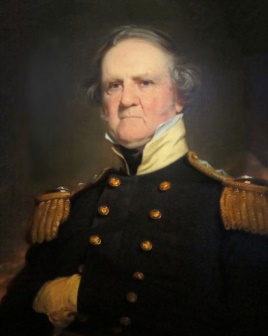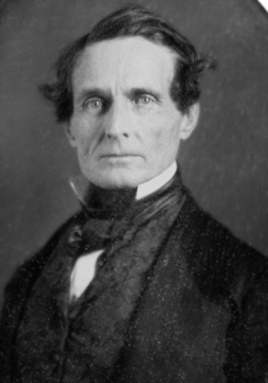VOA慢速英语:富兰克林.皮尔斯努力团结民主党
From VOA Learning English, welcome to The Making of a Nation, our weekly program of American history for people learningAmerican English. I’m Steve Ember.
Eighteen fifty-two was a presidential election year in the United States. TheDemocratic Party held its nominating convention in Baltimore, Maryland. Themeeting opened in June of 1852. Delegates agreed that a man must win two-thirds of the convention's votes to be the Democratic candidate.
On the first ballot, no one received two-thirds of the vote. So the votingcontinued. Finally, on the 47th ballot, support began to increase for someoneconsidered an unlikely candidate. His name was Franklin Pierce.
Pierce was from the northeastern state of New Hampshire. He was a lawyerand former state lawmaker. He also had served in the United States Senateand House of Representatives. He became an officer in the Army during the U.S. war with Mexico.
On the 49th ballot, Pierce won the Democratic nomination. He would be theparty's candidate for president.
“Pierce was a passionately loyal adherent of the Democratic Party and of itsprinciples of negative governance domestically and spread eagleexpansionism in foreign affairs.”
 |
|
General Winfield Scott in portrait by Robert Walter Weir. Scott was the Whig Party's candidate for President in the 1852 election. |
Historian Michael Holt wrote a book about Franklin Pierce. Mr. Holt describesPierce as someone who was like most Democrats at the time. In otherwords, he did not think the federal government should intervene much inefforts to help build up and develop the nation. But he wanted the UnitedStates to play a big and powerful role internationally.
Naturally, Democrats did not agree on every policy issue. In 1852, the partywas sharply divided on whether the government should — or could — permitslavery to continue in the United States. But Democrats decided to limit theirfighting with each other during the election campaign. And they all agreed tosupport Pierce.
The Whig Party held its presidential nominatingconvention in Baltimore two weeks after the Democratsmet. The same thing that happened at the Democraticconvention now happened at the Whig convention. Delegates voted over and over again. But no man gotenough votes to win. It took 53 ballots before one of themen -- General Winfield Scott -- won the nomination.
On Election Day, Pierce won a crushing victory. TheDemocrats won not only the presidency, but alsostrong majorities in Congress. The Democrats’ victorywas so great that many people thought the Whig partywas finished.
In fact, many Whigs themselves hoped their party wasdestroyed. Like the Democrats, Whigs disagreed witheach other about slavery. Northern Whigs wanted toform a new anti-slavery party. And southern Whigswanted to form a party that would better represent theirinterests.
The Whigs lost badly in the 1852 elections because, unlike the Democrats,they were not able to bridge the differences between their northern andsouthern members.
Franklin Pierce was 48 years old when he took office. He was the youngestman yet to be elected president. He was charming and made friends easily.
But those who knew Pierce best worried about him. They knew that under allhis friendly charm, he was a weak man. They feared the duties and problemsof the presidency would be too great for him to deal with.
Pierce also faced a difficult situation in his personal life. Two of his childrenhad died when they were babies. A third child was killed in a train accidentshortly before Pierce moved to the White House.
In addition, his wife Jane did not like living in Washington, D.C. She did notsupport her husband's campaign for presidency. Years earlier, she had urgedhim to resign from the Senate and return to New Hampshire. She did notwant to go back to Washington.
When her husband was elected, she agreed to live there. But she rarely sawanyone. One of her close friends took her place at public events.
Historian Michael Holt says Franklin Pierce’s main goal as president was tokeep his party united. One way to maintain party unity was to adopt popularDemocratic policies. He promised strong support for expanding the territoryof the United States. He also promised a strong foreign policy.
During his term in office, Pierce successfully negotiated with Britain to gainAmerican fishing rights along the coast of Canada. He also supporteddiplomatic and trade talks with Japan. However, he was unsuccessful in anattempt to buy Cuba from Spain.
National issues presented President Pierce with a more difficult problem. Now that the election was over, some Democrats felt it was time once againto raise the issue of slavery.
The Compromise of 1850 had settled the question of slavery only in thewestern territories. But anti-slavery activists said the compromise should havedone more to end slavery throughout the country. And pro-slavery activistssaid the agreement did not protect slave owners’ rights. They did not want thefederal government to intervene in slavery anywhere.
As president in 1853, Pierce had to choose between the competing sides. Hecould support the Compromise of 1850 and say the dispute over slavery wassettled.
Or Pierce could try to make peace with both anti- and pro-slavery extremists. Giving the extremists jobs in his administration would be the easy way tosatisfy their demands. And that was the policy Pierce chose.
“Contemporaries at the time predicted that this attempt to share the plumswould wreck the party, and it did.”
Historian Michael Holt says Pierce sought to include men from competingsides of the Democratic Party in his cabinet.
Pierce named William Marcy of New York as Secretary of State. Marcywanted to limit the spread of slavery and keep the Union together.
 |
|
Jefferson Davis in restored 1853 Daguerreotype |
Jefferson Davis of Mississippi was named Secretary ofWar. Davis -- more than any other man -- representedsouthern slave owners. He threatened to take theSouth out of the Union if the government set any limitson slavery.
Caleb Cushing of Massachusetts was named AttorneyGeneral. Although a northerner, Cushing was a friend ofmany southerners. He was a very able man, but hisloyalties were not clear. James Buchanan ofPennsylvania was named Minister to Britain.
All these men had strong ideas about the future of theUnited States. President Pierce found it difficult tocontrol them. One senator even said the administrationshould not have been called the Pierce administration,because Pierce did not lead it. He said it was anadministration of enemies of the Union who used thepresident's name and power for their own purposes.
As president, Franklin Pierce faced another difficult question. Where shouldthe United States build its new railroads?
The country had expanded and white settlers were moving west. Many werehungry for good transportation. They wanted railroads that reached acrossthe continent, from the Atlantic Ocean to the Pacific Ocean. Engineersdecided that four new rail lines would be possible. They could cross thesouthern, central, or northern parts of the United States.
Illinois Senator Stephen Douglas, a Democrat, proposed that three of the linesbe built. He said the government could give land to the railroad companies. The companies could then sell the land to get the money they needed to buildthe lines.
A Senate committee discussed the issue. Its members proposed that onlyone railroad line be built. But which one?
Many congressmen believed a southern line would be best. There would belittle snow in winter. And the railroad would cross lands that were alreadyorganized as states or official territories.
A northern or central line would face severe winter weather. And it would haveto cross a large, wild area called Nebraska. Nebraska was neither a state nora territory. As a result, it did not yet have a local government that couldsupport a railroad. In addition, many congressmen did not want Nebraska todevelop a government. The reason, once again, was slavery.
Michael Holt says members of President Pierce’s party hoped the effort toorganize Nebraska would unite Democrats once again. Instead, Mr. Holtsays, Nebraska territory caused more conflicts and ruined Pierce’sadministration. The bill increased divisions between Democrats and Whigs,pro-slavery activists and anti-slavery abolitionists. And, it brought the countryone step closer to civil war.
As one northerner wrote, "It was said hundreds of years ago that a housedivided against itself cannot stand. The truth of this saying is written on everypage in history. It is likely that the history of our own country may offer freshexamples to teach this truth to future ages."
The bitter dispute over Nebraska will be our story next week. I’m SteveEmber, inviting you to join us next time for The Making of a Nation — Americanhistory from VOA Learning English.
- 频道推荐
- |
- 全站推荐
- 推荐下载
- 网站推荐




















